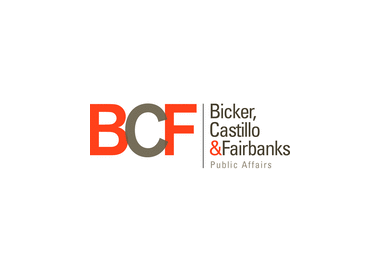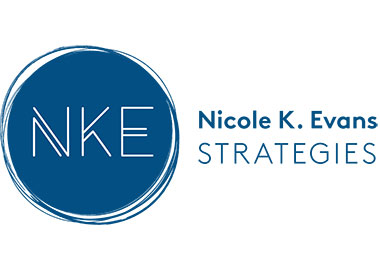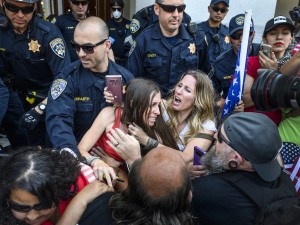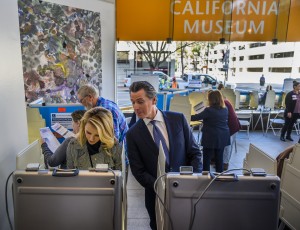

















Congratulations to the winners of the Sacramento Press Club’s inaugural Journalism Awards Contest for politics and policy reporting in California. Journalists and industry members alike submitted their work from 2020 but only 14 contestants were chosen as award recipients and honored at our inaugural Journalism Awards Reception on April 20, 2021.
This award honors the California journalist whose work has had a substantial impact on the state. Journalists on the Sacramento Press Club board will accept and vote on nominations from independent news organizations or a colleague of the journalist. A nomination letter must detail, with links to published work, why the journalist should be recognized. To qualify, a journalist should have published work that reflects the best of our profession: stories that reveal egregious wrongs committed against powerless populations, that force change in public policy decisions at the state level, or that provide a powerful public service to Californians, including comprehensive coverage during emergencies. This is not a team award, nor will it be given to an institution. It is intended to recognize a singular achievement by a journalist that benefits Californians. The award is given this year in honor the late Virginia Ellis, a veteran of the Sacramento bureau of the Los Angeles Times who found her professional calling in covering state government and honed in on issues that other reporters overlooked.
Laurel Rosenhall
CalMatters
Journalists on the board of the Sacramento Press Club have chosen as Journalist of the Year a Capitol press corp reporter whose work follows in the best tradition of Virginia Ellis’s efforts to hold government accountable.
Like Virginia, Laurel Rosenhall uses tenacious reporting and public records to hold politicians and other powerful people accountable for their decisions and actions. Judges were impressed by her ability to turn multiple investigations in one calendar year even as she competed on a broad range of Capitol stories. In the early days of the pandemic, she delivered an exclusive on a troubling half-billion-dollar state deal to buy personal protective equipment from a four-day-old company.
Laurel used her expertise with public records to show how politicians increasingly circumvent finance disclosure laws by asking donors to give money to their nonprofits. Such behested payments were only $105,000 in 2011 — but grew to $2.9 million in 2019. Her stories resulted in an ethics investigation.
Laurel also investigated why the NAACP endorsed propositions in the 2020 election that were criticized as bad for Black communities. She discovered that the consulting firm of the president of California’s NAACP was paid $1.7 million by the campaigns of the propositions she endorsed. Alice Huffman resigned in the aftermath.
It can be painstaking work to report and publish such a singular body of stories. Laurel sometimes was at the center of news surrounding the Legislature but also drove the news with stories that revealed what was going on outside the spotlight. Her reporting served readers while also keeping competitors on their toes. Such journalism is in the best interest of the public and a strong democracy.
This category recognizes exceptional journalism that holds powerful institutions and/or people accountable for their actions and, by doing so, leads to demonstrable change that benefits Californians. The submission should include a short cover letter explaining the impact or outcome of the work. Judges will consider overall impact, depth of reporting, and the use of today’s technology to reach the audience. Entries may be in any format including text, audio or video. Entries are limited to three stories.
WINNER
Joaquin Palomino, Cynthia Dizikes and Sara Tiano
“Far From Home, Far From Safe,” The Imprint and the San Francisco Chronicle
This in-depth exposé of states continuing to send kids to abusive residential treatment centers had impact even before it was published, with more than 100 children being brought back to California from an out-of-state center where they never should have been sent. Millions in funding to care for them in-state soon followed. This is traditional watchdog reporting at its best, beginning with a horrific death at one facility followed by a tip – and radiating out through documents, data, and human sources. In a year when all news staffs were working overtime to cover the coronavirus, it’s a tribute to these two outlets that they managed to maintain focus on this project.
FINALISTS
Jackie Botts, Kate Cimini, Laurence Du Sault and Manuela Tobias
“COVID In the Workplace,” CalMatters, the Salinas Californian, the Mercury News, and the Fresno Bee
A strong and comprehensive report that overlaid coronavirus outbreaks onto the chronic lack of farmworker safety measures, leading to decisive legislative action aimed at protecting those workers. Amid the urgency of the pandemic, it was smart to roll the stories out over time, adding new important details with each. We also appreciated that the articles were translated into Spanish, allowing them to reach affected communities that often remain unaware of their rights, and of the reporting being done about them.
Geoffrey King
“Police Shootings In Vallejo,” Open Vallejo
First Amendment attorney Geoffrey King has long urged other media to investigate police use of force in his hometown and, in 2019, he took matters into his own hands, launching the nonprofit Open Vallejo. On his first night as a full-time journalist, Vallejo police shot and killed another man. In this revelatory work, King used deep sourcing and images to prove out a shocking tip: that cops bent their badges to celebrate killings of civilians. Leaves of absence and retirements followed this work, with investigations likely on the horizon.
JUDGES
Amy Pyle, national investigations editor, USA Today; Peter Bhatia, editor, Detroit Free Press; and Audrey Cooper, editor in chief, WNYC
Decisions large and small are made each day in the California Capitol that affect the lives of the state’s 40 million citizens. This category recognizes a California journalist for their coverage of that daily drumbeat of action. Entries can include up to five examples of work that demonstrate sharp and clear writing, an important scoop, coverage of breaking Capitol news or continuing coverage of a particular topic, and an ability to explain to readers why the daily workings of the Capitol matters in their lives. Entries can cover a single topic or different issues.
WINNER
Laurel Rosenhall
CalMatters
This category drew several outstanding examples of aggressive, impactful beat reporting. The judges awarded top prize to Laurel Rosenhall for consistent, deep, compelling and exclusive reporting on how influence affects outcomes in California politics. Her accountability work revealed new aspects of growing financial ties between legislators and charities, uncovered a shocking pandemic contract the state had to undo and described how a convicted felon — the son of a prominent legislator — now walks the Capitol halls as an advocate.
FINALISTS
Sophia Bollag
The Sacramento Bee
Alexei Koseff
San Francisco Chronicle
Taryn Luna and Phil Willon
Los Angeles Times
JUDGES
Ruby Bailey, executive editor, Columbia Missourian and Missouri Community Newspaper management chair, University of Missouri School of Journalism; Shane Goldmacher, New York Times political writer; and Dan Smith, former Capitol Bureau Chief, The Sacramento Bee
California’s elected officials have enormous influence over the lives of the people they represent. This category recognizes journalism that takes a deeper look at the decisions made in the Capitol, the influences behind them and their effect on the broader public. Entries can include a single story or up to three pieces of work that cover one topic. Judges will be looking for exclusive reporting, strong writing voice and overall impact.
WINNER
Melody Gutierrez
“Million Dollar Views, Cheap Rent and Allegations of Favoritism at California State Parks,” Los Angeles Times
Classic government accountability reporting, ambitious enterprise extremely well executed. With detailed evidence from state documents, property tax data and exhaustive interviews, Melody Gutierrez revealed rampant abuse of a little-known perk: low-cost housing for favored parks’ employees amid the state’s most spectacular landscapes: Although the subject was off-the-news in the unprecedented pandemic year, the judges found the work impressive enough to rise above other entries, especially in a state also beset by a housing crisis.
FINALISTS
Lauren Hepler and Stephen Council
“How Bank of America Helped Fuel California’s Unemployment Meltdown,” CalMatters
It seemed like a good idea at the time: Give unemployed Californians a kind of debit card loaded with their benefit payments. The cards would be distributed by Bank of America at no cost — so they said — to the state. Instead, the program became a scammers paradise, as skillfully outlined by Lauren Hepler and Stephen Council. Their reporting highlighted the many aspects of this story — from an overwhelmed state agency, to a bank that yields little information about its workings, to the victims of fraud.
Patrick McGreevy and Maria La Ganga
“It Takes 150 Redials: Horror Stories from Californians Filing Unemployment Claims,” Los Angeles Times
Excellent reporting of a complex and ever-evolving story. Patrick McGreevy and Maria LaGanga took a deep dive into the institutional and personal consequences of the state’s massive failure to prepare for and respond to the pandemic. After as many as 12 million calls a week gridlocked an already antiquated and inadequate system, reporters brought statistics alive through the experiences of people that system was supposed to help.
JUDGES
A.G. Block, former editor, California Journal; Rob Gunnison, former director of school affairs, UC Berkeley Graduate School of Journalism; and Linda Rogers, contributing editor, CalMatters
Public polling suggests that housing and homelessness have risen to the top of the list of issues about which Californians are most concerned. This category recognizes exceptional reporting that explains the causes and effects of the state’s housing crisis and spotlights those it has left behind. Submissions can be a single outstanding story or up to three pieces that demonstrate a command of the beat, in any format including text, audio or video.
WINNER
Aaron Mendelson
“Stuck: Deceit, Despair and Death Inside a California Rental Empire,” KPCC and LAist
Well-written and meticulously documented, this expose digs into the alarming practices of one of California’s largest low-income landlords, PAMA owner Mike Nijjar, who’s amassed more than 16,000 rental units spread from San Bernardino to Sacramento. Aaron Mendelson’s coverage documents the horrific conditions, excessive evictions and numerous lawsuits over unsafe housing. He unearths the labyrinth of 170 PAMA-related business entities and explores the tangle of state/local enforcement agencies whose efforts to enforce health and safety standards are often uncoordinated, overwhelmed and ultimately ineffective. Rich in digital storytelling and accompanying maps/graphics, the series illustrates how unscrupulous landlords can toss low-income individuals into repetitive cycles of substandard housing and/or into homelessness. The series was a factor in last year’s LA District Attorney’s race and helped revive a state Assembly bill to create a California rental registry.
FINALISTS
Anna Maria Barry-Jester and Angela Hart
“Hard Lives Made Harder by Covid,” Kaiser Health News
The story is a blend of deep, thoughtful reporting and fine writing. It illustrates, in a very human way, the complexity of the homelessness crisis and why it is so difficult to solve.
Liam Dillon, Ben Poston and Julia Barajas
“Affordable Housing Can Cost $1 Million,” Los Angeles Times
With a deep dive into details, this piece dissects the many reasons — financial, political, economic and bureaucratic — why California has been unable to get affordable housing built at a time when it’s sorely needed. It traces the dispiriting 10-year saga of a Solana Beach project, where the cost to build “affordable” housing soared to as much as $1.1 million — per apartment.
Molly Solomon and Erin Baldassari
“Sold Out: Rethinking Housing In America,” KQED
A beautifully-produced podcast focused on California as the country’s epicenter of overpriced housing, the series offers the history on how we got here, the voices of those priced out, and compelling coverage of potential solutions being tried in communities and the Capitol.
JUDGES
Claudia Buck, former reporter, The Sacramento Bee; Cynthia Hubert, former writer, The Sacramento Bee; and Ginger Rutland, former editor, The Sacramento Bee
The coronavirus pandemic exposed the limits of California’s preparation for a public health crisis and laid bare the stark impacts of racial and income inequality in the state. But public health has long been at a center of some of our biggest political fights, from a single-payer health care system to mandatory vaccines. This category recognizes exceptional reporting on public health issues including health care access, mental health, substance abuse and food security, as well as the effects of and the government response to the coronavirus pandemic. Submissions can be a single outstanding story or up to three pieces that demonstrate a command of the beat, in any format including text, audio or video.
WINNER
Trisha Thadani
“Opioid Overdoses In the City,” San Francisco Chronicle
Trisha did an exceptional job of executing and displaying her many talents as a reporter: Her project was powerful in its investigative reporting, interviewing, narrative writing, data journalism and visual storytelling. Hers was a story that needed to be told, and she did so in a way that needed to be read.
In three compelling reports, Trisha Thadani of the San Francisco Chronicle details the human and societal toll that rampant drug use and overdoses have cost the city. Her portrait of one young man’s failed attempt to get off the streets is backed up by a digital map showing he was not alone in his struggle, while even one of San Francisco’s largest hospitals is overwhelmed by the magnitude of the problem.
FINALISTS
Anna Maria Barry-Jester and Angela Hart
“Hard Lives Made Harder By Covid,” Kaiser Health News
Anna Maria and Angela spun a beautifully crafted, heart-tugging saga, bolstered by solid reporting, interviewing and numbers crunching. It accomplishes that rarity in storytelling today — compelling long-form journalism that truly holds government accountable.
Kaiser Health News reporters delved into destructive swath that the coronavirus pandemic carved into California, from an upending of state efforts to alleviate homelessness to data failures in contract tracing programs that were aimed at saving lives.
Megan Cassidy and Jason Fagone
“California Prison Inmates and COVID-19,” San Francisco Chronicle
Megan and Jason did an impressive job of convincing readers that they should care about the health and well being of California’s state prisoners, including those on death row. To that end, they were successful with some of the most difficult reporting and interviewing that can be done — connecting with prisoners and prison officials behind the walls and inside the cells of California’s notoriously closed state prisons.
The San Francisco Chronicle’s Megan Cassidy and Jason Fagone repeatedly held California corrections officials accountable for missteps in their response to the coronavirus pandemic among the state’s prison population. Their reports showed how state officials repeatedly put prisoners at greater risk for contracting the disease.
Phillip Reese
“High-Poverty Neighborhoods Bear the Brunt of COVID’s Scourge,” California Healthline
Phillip is one of the true masters of data-driven journalism in California, and this project is a solid example of his effective use of numbers crunching as a means to an end.
Phillip Reese’s extensive use of data for California Healthline provided numerical proof that the coronavirus pandemic was disproportionally infecting and killing residents of the state’s poor and minority communities, the same people who often put themselves at greater risk by working jobs deemed essential.
JUDGES
Ken Chavez, director of media and community relations, Sunnylands, and former senior editor, The Sacramento Bee; Mitchel Benson, MDBenson07 Communications and former Wall Street Journal and San Jose Mercury News Capitol bureaus; and Michelle Raghavan, Center for Health Journalism
California has been at the forefront of the environmental movement for decades, and the state took an even more significant role under the Trump administration, leading the fight against the policies of the federal government. This category recognizes exceptional reporting about policy and activism related to water, clean energy, climate change, pollution, endangered species and other environmental topics. Submissions can be a single outstanding story or up to three pieces that demonstrate a command of the beat, in any format including text, audio or video.
WINNER
Rosanna Xia
“A Toxic Secret Lurks in the Deep Sea,” Los Angeles Times
A visually compelling, deeply reported, and elegantly told story of the still destructive impact of containers holding the neurotoxic pesticide DDT that were long ago dumped off the Southern California coast. Xia does a masterful job of using both history and new scientific research to tell the story of this long-haul poisoning of the ocean. She seamlessly charts the politics of risk and denial, and explains the roles of both old and new technologies, to create a remarkable portrait of how past decisions haunt our environmental future.
FINALISTS
Rachel Becker
“Legacy of a Clean Air Czar,” CalMatters
An unusually insightful look at the career of a powerful environmental regulator, Mary Nichols, that illuminates her influence on the state of California, her notable successes, and her complicated failures, acknowledging the growing importance of environmental justice in the way regulatory decisions are made.
Ryan Sabalow
“Nothing Wild,” The Sacramento Bee
A beautifully told, deeply researched series of stories exploring the imperiled state of Northern California’s native species and habitats, and the people who live with them, which illustrates both the often destructive impact of human activities and the complications of trying to reverse such impact.
JUDGES
Deborah Blum, Pulitzer Prize winner and director, Knight Science Journalism program, Massachusetts Institute of Technology; Thomas Hayden, director, Master of Arts in Earth Systems, Environmental Communication Program, Stanford University; and Felicity Barringer, writer in residence, Bill Lane Center for the American West, Stanford University
A summer of protest over the death of Black men and women at the hands of police sparked renewed resolve in the Capitol to tackle issues of systemic racism and injustice. This category recognizes exceptional reporting about political and policy-driven efforts to combat racial injustice. Submissions can be a single story or up to three pieces that demonstrate a command of the subject, in any format including text, audio or video.
WINNER
Jeremiah Dobruck
“Statistics show LBPD seriously injures people at high rate, but police say database is flawed,” Long Beach Post
This investigative story and data project is exactly the kind of racial justice journalism needed to foster more police accountability at a time the country is demanding it. Dobruck’s revelations that many of California’s largest police departments are using loopholes in reporting requirements to lower their number of serious and lethal force incidents led officials to demand an end to ambiguous reporting.
FINALISTS
Anita Chabria
Los Angeles Times
Chabria’s granular, intimate portrait of Stevante Clark, the brother of Stephon Clark, who was gunned down by Sacramento police in 2018, and her in-depth feature on how the chief of Stockton’s defunded police is trying to atone for his department’s past wrongs are strong, character-driven stories that exemplify what racial justice reporting should aspire to.
Jennifer Wadsworth
San Jose Inside
Wadsworth’s in-depth series provides a revealing, firsthand look at police misconduct during the May 29 protest in San Jose and details the department’s attempt to evade repercussions for its unjustified use of force that led to lifelong consequences for citizens seeking police accountability.
JUDGES
Neil Henry, former Washington Post reporter and UC Berkeley Graduate School of Journalism instructor; Soraya Sarhaddi Nelson, Berlin correspondent, National Public Radio; and Janine Zacharia, lecturer, Stanford University, and former Jerusalem bureau chief, Washington Post
Personality can be just as important to success in politics as ideas. This category recognizes great journalism that illuminates the people who run California and those who are impacted by their decisions. Submissions can be an interview with or a profile of a politician, an activist or another figure central to a state policy issue, in any format including text, audio or video. Entries are limited to a single story.
WINNER
David Siders
“The Fall of Michael Tubbs,” Politico
“Siders seems to solve any lingering mysteries about Michael Tubbs’ fall from City Hall”
“a deeply reported profile”
“an illuminating and important examination of a complex subject”
“Siders unravels and ties together the many threads of Tubbs’ unusual and controversial time as Mayor”
“great insight into a politician who started young and rose to national prominence”
FINALISTS
Scott Shafer and Guy Marzorati
“The Political Mind of Jerry Brown: But for Me,” KQED
“a comprehensive, highly informative contribution to the history of Jerry Brown”
“thoroughly reported with wonderful interviews and audio, drawing from a long history”
“such good work and great to listen to”
Samantha Young
“California GOP Consultant Rues ‘Big Mistake’ That Led to Family’s COVID Infections,” Kaiser Health News
“illustrates how humanity supersedes politics”
“puts the spotlight on an issue – COVID – that many people simply thought was ‘fake'”
“a contemporary, raw and revealing profile of a family in crisis”
JUDGES
Hector Amezcua, multimedia specialist, UC Davis, and former photographer, The Sacramento Bee; Sigrid Bathen, adjunct professor, Sacramento State; and Beth Ruyak, owner, Ruyak Media, and former host, “Insight,” Capital Public Radio
This award is for the best single spot news image related to California politics. This could include public gatherings, infrastructure or public figures with influence on state governance.
WINNER
Daniel Kim
The Sacramento Bee

Protester Heidi Munoz Gleisner, left, was removed from a demonstration against Gov. Gavin’s Newsom’s stay-at-home order by California Highway Patrol officers after they ordered a crowd of people to leave the Capitol grounds Friday, May 1, 2020.
The year 2020 was about how divided we are as a country. It was about whether we achieve peace and social justice, fight a deadly virus and to work together/unwillingness to work together. We think that the first place award captures that conflict. At first glance, the people do not appear to be typical political protestors at the State Capitol. We like the way it’s framed, which gives it high impact and a great moment.
FINALIST
Daniel Kim
The Sacramento Bee

California Gov. Gavin Newsom peeks over the shoulder of his wife, First Partner Jennifer Siebel Newsom, as they vote during the primary election on Super Tuesday at the California Museum in Sacramento on March 3, 2020.
Our honorable mention winner is a photograph of Gov. Gavin Newsom and First Partner Jennifer Siebel Newsom voting in the Super Tuesday election on March 3, 2020, over a year ago. Newsom is very media savvy and this is a photo opp. So one could guess that he was aware of the camera(s) and he created the moment. But it’s nicely framed and we give the photographer credit for being in the right place and getting a moment. It’s got a nice sense of place — being in public and that political events are theater. And a lot has happened in a year. This picture was made in March. Newsom may not be quite as playful probably in November. Context: In the state of California, this is the only access most counties allow to polling places. Photographers can follow a politician in and photograph them, so pictures in polling places have disappeared, which makes this historical and timely. Of note: The only opportunity we have to document voting is with politicians and yet it’s something we know can be done unobtrusively. But citizens have the opportunity to take a ballot selfie. And media doesn’t have access. It’s just kind of interesting where we’ve wound up.
JUDGES
Geri Migielicz, Hearst Professional in Residence, Stanford University; Mark Morris, former senior editor/visuals, The Sacramento Bee; and Sue Morrow, editor, News Photographer Magazine
The opinion section provides a public forum to hash out the most (and sometimes the least) important issues facing California. This category recognizes exceptional commentary that changed minds, held the powerful to account or perhaps simply delighted its audience. Submissions can be up to three opinion pieces in any format, including editorials, columns, cartoons and videos.
WINNER
Erika D. Smith
Los Angeles Times
Erika Smith submitted an impressive collection of columns, all relevant to state politics and policy. All had a clear, compelling, public spirited point of view and the three columns represented a diverse set of topics. They also reflected her own immersion in the subjects she chose to research and write about from a strong personal perspective.
FINALISTS
Gil Duran
The Sacramento Bee
George Skelton
Los Angeles Times
JUDGES
Jim Boren, executive director, Fresno State Institute for Media and Public Trust, and former executive editor, The Fresno Bee; Rebecca LaVally, lecturer, Sacramento State, and former Sacramento bureau chief for United Press International and Gannett News Service; Jon Ralston, editor, The Nevada Independent; and Rick Rodriguez, professor, Arizona State University, and former executive editor, The Sacramento Bee
The newsletter award is judged on news value, sharp takes of the day’s events, scoops and original reporting, whether the letter delivers what it promises, ease of reading, design, and use of art and graphics. Issue-specific letters on such topics as the environment or public health would be considered. Entries are limited to three samples of the same newsletter.
WINNER
California Playbook by Jeremy White and Carla Marinucci
Politico
The conversational writing crackles with wit and verve; the newsy coverage is packed with context and sharp insights; and the fast-moving format makes for an engaging read. An exemplary newsletter.
FINALISTS
Essential Politics by John Myers
Los Angeles Times
Essential Politics is an excellent newsletter. John Meyers offers solid reporting with a strong writing style. He tackles complex political stories but makes them interesting and easy to understand. The reader always learns something new.
MicroClimates by Taylor Kate Brown
San Francisco Chronicle
Taylor Kate Brown’s MicroClimates, The Chronicle’s climate change newsletter, combines original reporting, myriad perspectives and essential context for a newsletter that is informative, engaging and connects the Bay Area with larger state and global issues.
JUDGES
Molly Dugan, professor, Sacramento State; Josh Freedom du Lac, director, global live news, The Washington Post; and Manny Ramos, media trainer and former TV reporter
This award is for creative online storytelling on a single California political or policy issue through any combination of data visualization, online interactive, photo, video, audio or text. This could be a single piece or a serialized story, with entries limited to five installments.
WINNER
Trisha Thadani and John Blanchard
“Overdoses, everywhere,” San Francisco Chronicle
The maps in this package contain tiny dots showing the location of opioid overdoses. Interspersed with the maps are photos of those who have suffered; the points brought to life. Taken together, the maps, charts, and photos tell a story at a glance, but also give readers the chance to explore. Well done.
FINALISTS
Monica Dean and Tom Jones
“Stolen: A Year-long Investigation Into Child Sex Trafficking and Exploitation,” NBC 7 San Diego
This meticulous, ambitious project takes on the horrific subject of sex trafficking using video, an interactive feature, and a series of podcasts. The story’s findings are a compelling call to action. Bravo to NBC 7 for committing so many resources to this important effort.
CalMatters staff
“California Election Guide, November 2020,” CalMatters
The plight of the California voter: Too many propositions on the ballot! These brief, readable — even kind of fun — guides to each proposition from CalMatters make the process a lot easier. Good journalism like this promotes democracy.
JUDGES
P. Kim Bui, director of audience innovation, Arizona Republic; Richard Koci Hernandez, visual journalism professor, UC Berkeley; and Phillip Reese, data journalist, The Sacramento Bee, and professor, Sacramento State
This award is for a single story or a series of up to three stories that informed California’s Spanish-speaking community about an influential political or policy issue. The story could be text, audio, video or any combination, and would be judged on news value, depth of reporting and relevance to its audience. Entries will be judged by Spanish-speaking journalists.
WINNER
Kim Bojórquez
The Sacramento Bee
For her stories “Latinos de la Generación Z votan en California” (Gen Z Latinos vote in California) and “Estos Latinos de California quieren votar por Trump en 2020” (These Latinos from California want to vote for Trump in 2020) for the news value of these pieces during the election times, but mostly for the depth of reporting and relevance to its California’s Spanish-speaking community.
FINALISTS
Viviana Paez, Maikel Dagostino and Luis Godinez
Univision
For their piece regarding San Joaquin County’s Latino ag workers and their struggle during the COVID 19 pandemic, bringing up the needs of the community to local authorities to find solutions and also awareness to the community in general.
JUDGES
Maria Jeans, former news producer, Univision; and Gonzalo Magana, executive producer, ABC10 Sacramento
Thank you to our sponsors:


















